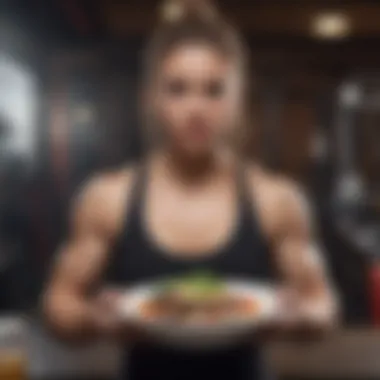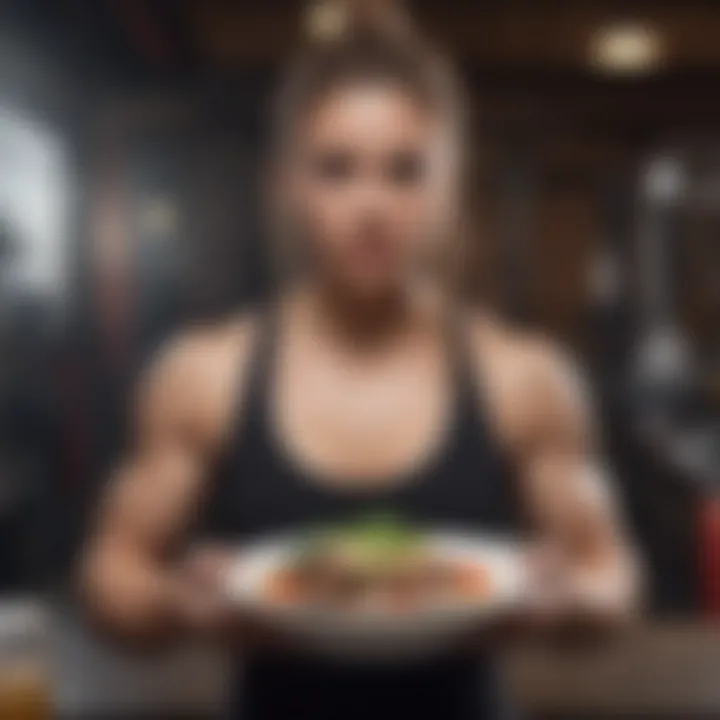Nutritional Strategies for Vegan Powerlifters


Intro
In a world that has slowly turned towards more conscious eating habits, the vegan powerlifter diet offers a strikingly unique avenue through which strength training can flourish. Powerlifting, often associated with protein-rich animal products, finds a fresh perspective in plant-based nutrition. The ides is simple: can one harness the strength needed for heavy lifts without the caloric intake from conventional sources? The answer is yes, and this article aims to provide you with insights into how vegan powerlifters can optimize their performance.
As we peel back the layers of this nutritional paradigm, we will explore how a well-planned vegan diet can provide necessary fuel, while still respecting ethical dietary choices. It’s not just a matter of substituting a steak for tofu; it’s about understanding what happens to the body at a cellular level when it’s fed the right nutrients.
The role of macronutrients—proteins, fats, and carbohydrates—is integral to this discussion, as is the inclusion of micronutrients, vitamins, and minerals that often get overlooked in the general conversation on plant-based diets. Diving into specifics, we’ll cover meal planning, supplementation, and culinary choices that boost both physical and mental performance. This journey isn’t only about lifting weights; it’s about how a thoughtful approach to diet can enhance overall health, resilience, and well-being.
So, let’s roll up our sleeves and unpack the many facets of the vegan powerlifter diet.
Understanding Powerlifting
The realm of powerlifting is not just about raw strength; it’s a delicate balance between strategy, nutrition, and rigorous training. For those venturing into this competitive sport, understanding the fundamentals of powerlifting is essential. This section aims to illuminate the core components of powerlifting while emphasizing the nutritional intricacies that can support athletic performance.
Overview of Powerlifting
Powerlifting typically consists of three major lifts: the squat, bench press, and deadlift. Each of these lifts tests a different facet of strength. Most lifters establish personal records, known as PRs, and compete against others in their weight classes. Training revolves around building strength through progressive overload, where the lifter gradually increases the weight they are lifting over time.
What sets powerlifting apart from other strength disciplines is the focus on maximal strength output rather than aesthetics or muscular endurance. Competitors enjoy an environment that pushes them to their absolute limits, forging not just physical resilience but mental fortitude as well.
In powerlifting, every fraction of a second counts; each lift is performed in a highly controlled manner, prioritizing proper technique alongside strength. This makes understanding the sport's demands crucial for anyone aspiring to reach their peak potential.
Key Nutritional Needs for Strength Athletes
When it comes to strength athletes, particularly those following a vegan lifestyle, nutrition plays a paramount role. Nutritional requirements for powerlifters differ significantly from those of casual gym-goers. Here are a few important considerations:
- Caloric Intake: Powerlifters need to consume adequate calories to support their intensive training regimens. Maintaining energy levels is non-negotiable to perform optimally during workouts.
- Protein: Ensuring sufficient protein intake is critical for muscle repair and growth. For vegan powerlifters, it becomes even more essential to source protein from diverse plant-based options, including lentils, chickpeas, and achieving the right amino acid profiles through complementary proteins.
- Carbohydrates: These are vital for fueling training sessions and aiding in recovery. While many view carbs as the enemy, powerlifters need them to replenish glycogen stores post-workout. Incorporating whole grains and starchy vegetables can provide sustained energy.
- Micronutrients: While macronutrients get much of the attention, it’s the vitamins and minerals that can make a substantial difference, especially in nutrient-dense vegan diets. Iron, calcium, zinc, and B12 present unique challenges for those pursuing plant-based lifestyles but are necessary for performance and overall health.
Nutrition for powerlifters isn't just another item on the to-do list; it’s the backbone of their training success.
To sum it up, the foundation of powerlifting is built on understanding both the physical and nutritional realms of the sport. As we delve deeper into the vegan powerlifting diet, the insights gained in this section will lay the groundwork for further exploration into nutrient sourcing and meal planning strategies tailored for both strength and well-being.
Foundation of a Vegan Diet
A strong understanding of the foundation of a vegan diet is essential for powerlifters who wish to maximize their performance while adhering to a plant-based lifestyle. This section will explore the essential components of plant-based nutrition, as well as the benefits and challenges that come with veganism in sports. Understanding these aspects can enhance not only training efficiency but also overall health.
Essential Components of Plant-Based Nutrition
When it comes to plant-based nutrition, several vital components stand out that ensure powerlifters receive adequate fueling. Here are the key elements:
- Proteins: While commonly associated with animal sources, proteins can be obtained through a variety of plant-based options. Foods like lentils, chickpeas, and quinoa offer complete protein profiles. Including a mix of grains and legumes can supply the essential amino acids necessary for muscle repair and growth.
- Carbohydrates: Carbs are the fuel for powerlifters, providing energy for intense workouts. Complex carbohydrates from oats, brown rice, and sweet potatoes deliver sustained energy levels, aiding in performance and recovery.
- Fats: Healthy fats are integral for hormone production and overall health. Avocados, nuts, and seeds contain monounsaturated and polyunsaturated fats that can be beneficial for lifting. Omega-3 fatty acids, often obtained from flaxseeds or chia seeds, are crucial for their anti-inflammatory properties.
- Micronutrients: Alongside macronutrients, vitamins and minerals play a significant role in performance. Nutrients like B12, Vitamin D, iron, and calcium are critical yet can be lacking in a vegan diet if not properly supplemented. Leafy greens, fortified foods, and careful meal planning can help in addressing these nutritional gaps.
This essential knowledge creates a pathway for vegan athletes to meet their nutritional needs while keeping their dietary choices aligned with their values.
Benefits and Challenges of Veganism in Sports
The pros and cons of adopting a vegan diet in the sphere of sports, particularly powerlifting, merit careful examination. Here’s a look at some of the key points:
Benefits:
- Improved Recovery: A diet rich in antioxidants, found in fruits and vegetables, can speed up recovery times and reduce muscle soreness. This enables more frequent training sessions, which is valuable for strength gains.
- Heightened Focus on Ingredients: Veganism often encourages athletes to be mindful eaters, prompting them to select whole, nutrient-dense foods that can lead to better overall health.
- Weight Management: Many find that a vegan diet supports a healthier body weight due to an increased intake of vegetables and whole grains, which may contribute to improved performance.
Challenges:
- Nutrient Deficiencies: Vegan athletes need to be diligent in planning to avoid deficiencies, particularly in iron and vitamin B12, which can impact energy levels and performance.
- Social and Cultural Factors: Navigating social situations where food options are limited may pose difficulties. Powerlifters might need to plan ahead more often than their non-vegan counterparts.
- Availability of Foods: Depending on the athlete's location, finding appropriate plant-based options might be a challenge, especially when traveling for competitions.
"The well-planned vegan diet can be both enriching and powerful, but it requires attention to detail and a commitment to nutritional education."


In summary, the foundation of a vegan diet introduces a rich tapestry of nutrients that can empower powerlifters while also presenting specific challenges. As athletes become more informed about their dietary choices, they can harness the advantages and navigate the hurdles effectively.
Macronutrients for Vegan Powerlifters
When it comes to powerlifting, the term "macronutrients" often rings a bell for both seasoned athletes and newcomers. These are the building blocks of diet and indeed the difference between lifting the barbell or getting bogged down by fatigue. For a vegan powerlifter, understanding and effectively managing these macronutrients can take one’s performance to a whole new level. The three primary macronutrients are protein, carbohydrates, and fats—each serving a unique function, particularly for those lifting weights in a plant-based framework.
Protein Sources: Beyond the Basics
In the realm of powerlifting, protein is king. It’s crucial for muscle repair, growth, and recovery—without sufficient protein, even the fiercest training regimens can lead to stagnant progress. For vegans, the path to adequate protein intake has its shares of twists and turns. While conventional wisdom often points to animal-derived sources, plant-based options abound if one knows where to look.
Legumes such as lentils, chickpeas, and black beans are not only affordable but packed with protein. Quinoa, a rare plant source of complete protein, can be a staple on the plate. Tofu and tempeh also shine, being extremely versatile in the kitchen. To amplify intake, consider nutrient-dense snacks such as hummus or edamame. Moreover, adding powdered protein from pea or brown rice can help in topping off those numbers. It’s not just about eating protein; rather, it’s about deriving it from varied sources to capture the full range of amino acids.
Carbohydrates: Fueling Training and Recovery
Don’t let anyone tell you carbs are the enemy, especially in the sphere of powerlifting, where intensive training takes a toll on energy stores. Carbohydrates serve as the primary energy source fueling the muscular engine during heavy lifting sessions. Think of them as the nitrous for a racecar—vital for peak performance.
Starches from whole grains like brown rice, oatmeal, and whole-grain bread provide long-lasting energy. Fresh fruits, not just for their refreshing taste, also offer beneficial sugars that can aid recovery. For intense training days, consider energy-dense options like sweet potatoes and pasta, ensuring sustained power through rigorous workloads.
To aid in recovery, particularly after strenuous workouts, consuming a combination of carbohydrate and protein can help restore glycogen levels rapidly. A study suggests that consuming a meal with both carbs and protein can enhance recovery better than consuming them separately. This intelligent pairing can lead to less muscle soreness as well—certainly a win-win situation for any powerlifter.
Fats: The Importance of Healthy Fats
While fats may often get a bad rap in the fitness community, they are indispensable for vegan powerlifters. These pesky but necessary macronutrients play a vital role in hormone production, including those hormones that help build muscle. Healthy fats also aid in the absorption of fat-soluble vitamins, such as A, D, E, and K, which are crucial for overall health and athletic performance.
Avocados, nuts, and seeds provide plentiful unsaturated fats that can be easily integrated into meals. Olive oil, a staple in many kitchens, is great for salads or as a cooking base. Flaxseeds and chia seeds are not just trendy superfoods; they are packed with omega-3 fatty acids, which can help in inflammation reduction after those heavy lifting sessions.
Micronutrients in a Plant-Based Diet
Micronutrients are often relegated to the sidelines in discussions about diet and nutrition, primarily because they don’t come with the same flash as macronutrients. However, for vegan powerlifters, these small yet mighty elements—vitamins and minerals—play a crucial role in supporting overall health, recovery, and performance. Ignoring them can be like driving a sports car on empty; you might go fast for a bit, but ultimately, something’s going to give. In the world of strength training, where every rep counts, micronutrients become your unsung heroes.
Incorporating a balanced array of micronutrients is essential for optimal performance. They not only help in energy production but also support muscle contraction, immune function, and recovery after intense training sessions. The right mix can elevate a powerlifter's performance from competent to competitive.
Key Vitamins and Minerals for Optimal Performance
To truly harness the power of a vegan diet, understanding the specific vitamins and minerals that contribute to performance is vital. Here’s a list of some key players:
- Vitamin D: Supports bone health and muscle function. Vegan sources include fortified foods and sunlight exposure.
- B12: Crucial for energy production and neurological function. Since it’s mainly found in animal products, vegans should consider supplements or fortified foods.
- Vitamins C and E: Antioxidants that help combat oxidative stress brought on by rigorous lifting sessions.
- Zinc: Vital for recovery and immune support, often sourced from legumes and nuts in a vegan diet.
Overall, these micronutrients serve a purpose beyond just helping you lift heavier. They ensure that your body remains a well-oiled machine, accurately responding to your hard work in the gym.
Iron and Calcium: Particular Considerations
Now, let’s dive deeper into two specific micronutrients that often raise eyebrows when we talk about a plant-based diet: iron and calcium.
Iron
Iron is a fundamental component in delivering oxygen to muscle tissues, and inadequate levels can lead to fatigue—definitely not what a powerlifter needs. The good news is there are plant-based sources available, such as lentils, chickpeas, and quinoa. However, plant-based iron (non-heme iron) is not absorbed as efficiently as its heme counterpart found in meat. Pairing iron-rich foods with vitamin C sources like bell peppers or citrus fruits can help enhance absorption.
Here's a tip: soak and sprout beans and legumes to maximize their nutrient profile. This often emphasizes their iron content.
Calcium
Next up is calcium, critical for muscle contractions and bone health. While dairy is an obvious source, vegans can happily turn to options like fortified plant milks, tofu made with calcium sulfate, and leafy greens. One challenge with plant sources, however, is the presence of oxalates in certain vegetables, which can inhibit calcium absorption.
Just like with iron, it’s about finding strategies to make the most of what you consume. Balance your greens with fibrous grains or legumes to allow for better calcium utilization.
"Success in powerlifting is not just about muscle; it's about balance, nutrition, and recovery. Micronutrients can be the secret sauce in this equation."
Understanding and prioritizing these micronutrients within a vegan framework can steer powerlifters clear of common pitfalls. With strategic planning and knowledge, achieving peak performance becomes an attainable goal. Making your diet vibrant and nutrient-rich not only enhances performance but also leads to overall well-being—because at the end of the day, a healthy body is a powerful body.


Meal Planning Strategies
Meal planning is a cornerstone for any powerlifter, particularly those adopting a vegan diet. It holds significant importance as it allows athletes to take full control of their nutritional intake, ensuring they meet their energy demands while optimizing performance. Proper meal planning helps in tackling the often-cited challenges faced by vegan powerlifters, such as achieving sufficient protein intake and maintaining overall well-being. It permits the creation of specific dietary patterns that align with training objectives, ultimately translating into better lifts and improved recovery.
Crafting Balanced Meals for Strength Athletes
When it comes to crafting balanced meals, the emphasis should be on a variety of nutritious options that cater specifically to the needs of strength athletes. A well-structured meal should deliver the right proportion of macronutrients and micronutrients. Here’s a closer view on how to put together such meals:
- Protein: Aim to incorporate diverse plant-based protein sources, including lentils, chickpeas, quinoa, and tofu. Each offers a unique amino acid profile, which is crucial for muscle repair and growth.
- Carbohydrates: Opt for complex carbohydrates that provide sustained energy. Whole grains such as brown rice, barley, and oats work well, alongside starchy vegetables like sweet potatoes.
- Fats: Include healthy fats, which are essential for hormone production and overall cellular health. Nuts, seeds, avocados, and olive oil can enhance meals while adding nutrient density.
"Creating meals that are not only tasty but also nutritionally rich is like laying a solid foundation for your performance pyramid."
Balancing these elements is vital, but it is equally essential to consider portion sizes and timings. Reflecting on personal preferences and food tolerances is paramount. For instance, some may find that including heavier meals close to training sessions can lead to discomfort during lifts, while others may thrive on those meal types. Keeping a food diary can provide insights into individual responses to different combinations of foods.
Meal Timing: When to Eat for Maximum Performance
Meal timing is a critical aspect that often gets overshadowed by what is consumed. For powerlifters, knowing when to eat can significantly influence performance and recovery. Here are some practical points about meal timing:
- Pre-Workout Nutrition: Fueling the body before a workout is essential. Aim for a meal containing both carbohydrates and protein about 1.5 to 3 hours before training. This window allows for digestion, ensuring energy is available during lifts. For example, a banana smoothie with plant protein can serve as a quick, convenient pre-training fuel.
- Post-Workout Recovery: Immediately after lifting, the body is primed for nutrient uptake. Consuming a meal rich in protein and carbohydrates within 30 to 60 minutes can maximize recovery. This could involve a chickpea salad with quinoa and a handful of nuts, replenishing glycogen stores while repairing muscle fibers.
- Throughout the Day: Instead of eating two or three large meals, spreading intake across the day – perhaps five or six smaller meals – can maintain energy levels and support consistent performance.
In essence, thoughtful meal timing and planning serve as foundational elements that can dramatically influence a vegan powerlifter's success. Understanding the interplay between nutrient intake, timing, and training schedules is an empowering step toward achieving strength goals.
Supplementation: Finding the Right Fit
Supplementation has become an increasingly important topic when discussing a vegan powerlifter's diet. It helps bridge nutritional gaps that may exist in a plant-based regimen. While whole foods provide a base for optimal performance, supplements can enhance strength gains, recovery, and overall health. For those dedicating their lives to powerlifting, ensuring they have the right nutrients is crucial.
The necessity of supplementation can often come down to individual needs. Each body is different; people process nutrients uniquely. For vegan athletes, understanding what supplements may be required is a key piece of the puzzle. Some nutrients, like vitamin B12, iron, and omega-3 fatty acids, are more commonly deficient in vegans, which could affect performance negatively. Keeping tabs on these nutrients can prevent issues associated with deficiencies.
Understanding Vegan Supplements
When discussions arise surrounding vegan supplements, clarity and knowledge are essential. Not all supplements are created equally, and not all are appropriate for those following a plant-based diet. Vegan supplements are usually derived from plant sources, which makes them suitable for individuals avoiding animal products.
But what should one look for when deciding on vegan supplements? Here are some core elements to consider:
- Ingredients: Opt for supplements with clearly labeled ingredients that identify plant-based sources.
- Quality Assurance: Look for third-party tested brands to ensure purity and effectiveness.
- Bioavailability: Check if the nutrients in the supplement are in a form that the body can easily absorb.
- Specific Needs: Tailor your supplementation strategy to directly address any nutritional gaps identified through blood tests or dietary assessments.
"Nutritional knowledge is power—it's not just about eating right but also about knowing what your body requires to perform at its best."
Popular Supplements for Powerlifting
Powerlifters may benefit significantly from particular supplements that can enhance physical performance and recovery. Here’s a rundown of common picks for those who are vegan:
- Protein Powders: Options like pea protein, brown rice protein, and hemp protein can help reach daily protein requirements without relying on animal products.
- Creatine Monohydrate: Found in supplement form, creatine may help improve strength and muscle mass. It is mostly plant-friendly although always double-check the sourcing.
- BCAAs (Branched-Chain Amino Acids): These help with muscle repair post-workout. Vegan brands typically use plant sources to create them.
- Omega-3 Fatty Acids: Algal oil is a popular vegan source of omega-3s that can help reduce inflammation and aid recovery.
- Multivitamins: A well-rounded multivitamin can ensure coverage of nutrients like zinc, selenium, and others that might be challenging to obtain through diet alone.
When selecting supplements, it's wise to consult with a healthcare professional or a nutritionist well-versed in vegan nutrition. Personalization is key, as tailoring the supplementation plan to individual factors can make all the difference in reaching strength goals.
Real-Life Vegan Powerlifter Success Stories
In the realm of strength sports, the narrative of a vegan lifestyle has often been met with skepticism. However, real-life success stories from vegan powerlifters have begun to shift perceptions. These individuals exemplify that achieving peak performance on a plant-based diet is not just possible—it's a thriving reality. This section dives into the importance of highlighting their journey, showcasing the potential of a vegan diet for strength athletes while tackling prevalent doubts.
One of the main benefits of sharing these stories is the motivation they provide to others. For aspiring powerlifters who might be considering the switch to a vegan diet, hearing from those who have successfully navigated this path can serve as a beacon of hope and encouragement. It demonstrates that dietary choices need not compromise strength or performance. Furthermore, these narratives break down barriers, challenging outdated beliefs about protein sources and energy levels in plant-based diets.
Interviews with Successful Vegan Powerlifters
Interviews with successful vegan powerlifters allow us to listen firsthand to their experiences and insights. For example, consider Samira Cole, a powerlifter who has achieved national recognition after adopting a vegan diet. In a sit-down conversation, she often shares how her decision to go plant-based was driven by both ethical considerations and a desire for better health.
"I thought I might have to sacrifice my performance, but it turned out to be just the opposite. My lifts improved, and my recovery is smoother now than before!"
Another powerlifter, David Lin, emphasizes the importance of tailored nutrition. He explains that transitioning to veganism forced him to become more educated about food sources, focusing on nutrient density. David states, "I became more creative in the kitchen. Now, I'm not only lifting heavy but also enjoying delicious meals that energize me for my training sessions."


These interviews illuminate the diverse motivations behind going vegan, whether it's for health, environmental, or ethical reasons. They highlight practical strategies these athletes employ to maintain energy and strength, while also touching on the psychological aspect of competing on a vegan diet. Each story weaves a narrative of resilience, adaptation, and triumph.
Analyzing Their Diets and Training Regimens
Examining the diets and training regimens of successful vegan powerlifters reveals crucial insights for those looking to mimic their success. By dissecting what these athletes consume, one can glean ideas for balanced nutrition tailored to meet strength training demands.
Common Dietary Choices:
- Legumes: Beans and lentils play a pivotal role, being rich in protein and fibers.
- Whole Grains: Quinoa and brown rice are often staples, providing essential carbs and protein.
- Nuts and Seeds: Almonds, chia seeds, and flaxseeds contribute healthy fats, alongside vital nutrients.
Furthermore, these athletes don’t shy away from fortified foods. They often emphasize the need for B12 and omega-3 supplements in their diets, recognizing the gaps that exist in a plant-based regimen.
When it comes to training, a common theme emerges—planning. Vegan athletes often structure their meals around their workout schedule, paying close attention to pre- and post-workout nutrition to optimize performance and recovery.
Example Meal Timing Strategy:
- Pre-Workout: A combination of banana and almond butter to provide immediate energy.
- Post-Workout: A smoothie packed with spinach, protein powder, and a banana for recovery.
These practical insights serve to dismantle the misconception that vegan diets are inadequate for high-caliber performance. Instead, they illustrate a thoughtfully planned approach that supports both muscle growth and ongoing training success.
In summary, real-life vegan powerlifter success stories not only inspire but educate. By sharing personal journeys and dietary strategies through interviews and analysis, they provide valuable lessons for anyone interested in optimizing their performance without compromising ethical or health standards.
Addressing Common Concerns and Misconceptions
Addressing common concerns and misconceptions about veganism in the context of powerlifting is crucial for several reasons. Many athletes and enthusiasts may hesitate to adopt a plant-based lifestyle due to doubts about its adequacy in supporting strength training needs. This section aims to clarify these concerns with evidence and practical insights, thus providing reassurance to those considering a vegan diet for their powerlifting journey.
Debunking Myths Surrounding Veganism and Strength
Misconceptions about vegan diets can be thick as thieves. One prevalent myth is that plant-based diets lack sufficient protein for building muscle. The truth is, a well-planned vegan diet can offer ample protein. Sources such as lentils, chickpeas, quinoa, and various soy products provide considerable amounts of protein. Many individuals have successfully built muscle mass and increased strength on a vegan regime.
Another myth suggests that vegans are generally weaker and unable to compete at high levels in strength sports. However, numerous vegan athletes have proven this wrong. Powerlifting champion and vegan athlete, Patrik Baboumian, has demonstrated strength that surpasses many traditional meat-based diets. This dispels the stereotype that one cannot achieve strength without animal products.
Additionally, there's a misconception that vegan diets are expensive and complicated. While some plant-based products can be pricey, basics such as beans, rice, and seasonal vegetables can be quite economical. This accessibility makes it viable for a wide range of budgets.
In summary, debunking these myths demonstrates that a vegan diet can not only meet, but in some cases, exceed the nutritional and strength needs of powerlifting athletes.
Discussing Energy Levels and Performance
One of the primary concerns among athletes transitioning to a vegan diet is the potential impact on energy levels. Many fear that without animal proteins and fats, they might feel sluggish, especially during intense training sessions. However, numerous studies suggest that when well-planned, a vegan diet can actually support sustained energy levels.
Complex carbohydrates, which are abundant in whole grains, fruits, and vegetables, serve as the cornerstone of energy for athletes. These foods fuel workouts and promote optimal recovery. For instance, a meal of brown rice with black beans and steamed broccoli not only packs nutrients but also provides a steady release of energy.
It's also essential to underscore the role of micronutrients such as B vitamins and iron, which can be more readily found in whole plant foods compared to processed vegan options. These nutrients can significantly enhance energy metabolism and overall performance.
Some athletes even report feeling more energetic and lighter on their feet after adopting a vegan lifestyle. This reduction in saturated fats often found in animal products can lead to better overall digestive health, thus contributing to a more efficient energy use during workouts.
Closure and Future Considerations
The realm of vegan powerlifting continues to grow, reflecting not just a trend, but a steadfast dedication among athletes to merge strength training with ethical living. This article shines a light on the specific nutritional needs for vegan powerlifters, but it doesn't end here. Understanding the nuances of a plant-based diet is crucial for anyone committed to powerlifting goals while maintaining such a lifestyle. Making informed dietary decisions can set the stage for enhanced performance and overall health.
Recap of the Key Points Covered
Recapping our discussion, several key insights emerged:
- Nutritional Balance: A successful vegan powerlifting diet hinges on a well-balanced intake of macronutrients—proteins, carbohydrates, and fats—all sourced from diverse plant-based origins.
- Essential Micronutrients: Powerlifters must pay extra attention to vitamins and minerals like iron, calcium, and vitamin B12. These nutrients are often less abundant in plant sources, necessitating strategic food choices.
- Meal Planning: Crafting meals with the right timing not only fuels workouts but also aids in recovery. Understanding when to consume certain meals can optimize energy levels.
- Supplementation: While whole food sources should be prioritized, there are times when supplements like protein powder or creatine can fill dietary gaps for vegans who lift heavy.
- Misconceptions: Debunking myths surrounding veganism and its impact on energy and strength is vital for many aspiring athletes. Many find that, contrary to popular belief, plant-based diets can indeed support high levels of performance.
Thus, every facet of this diet, when carefully chosen and planned, aligns with the powerlifting journey.
Looking Ahead: Evolving Trends in Vegan Powerlifting
The future of veganism in the powerlifting community looks promising, with several trends emerging:
- Innovative Products: Expect more companies to develop vegan supplements that cater specifically to strength training needs. The demand for protein-rich, plant-based snacks is also likely to surge.
- Increased Research: As more athletes adopt a vegan lifestyle, the research surrounding performance outcomes for plant-based diets will grow. This will provide clearer insights into strategies for optimization.
- Broader Acceptance: The stigma surrounding veganism in strength sports is dissipating. More powerlifters are sharing success stories that inspire others and cultivate acceptance of plant-based diets in traditionally meat-centric athletic spaces.
- Community Support: Online forums, social media groups, and local meet-ups are increasingly focused on connecting vegan powerlifters. This sense of community fuels motivation and sharing of meal ideas, recipes, and training methods.
In sum, the journey of a vegan powerlifter is continuously evolving. There’s no one-size-fits-all, but with the right knowledge and a thoughtful approach to nutrition, the potential for success is immense. As the community grows, so too does the wealth of information and support available, creating a vibrant culture that champions both strength and compassion.















